In 1852, Elisha Smith purchased a struggling pail factory, creating a multi-generation family enterprise. Menasha Corporation is now one of the oldest, family-owned manufacturing businesses in the country—mainly due to our willingness to evolve and innovate to meet customer needs. Scan this timeline for the challenges and turning points in our history.
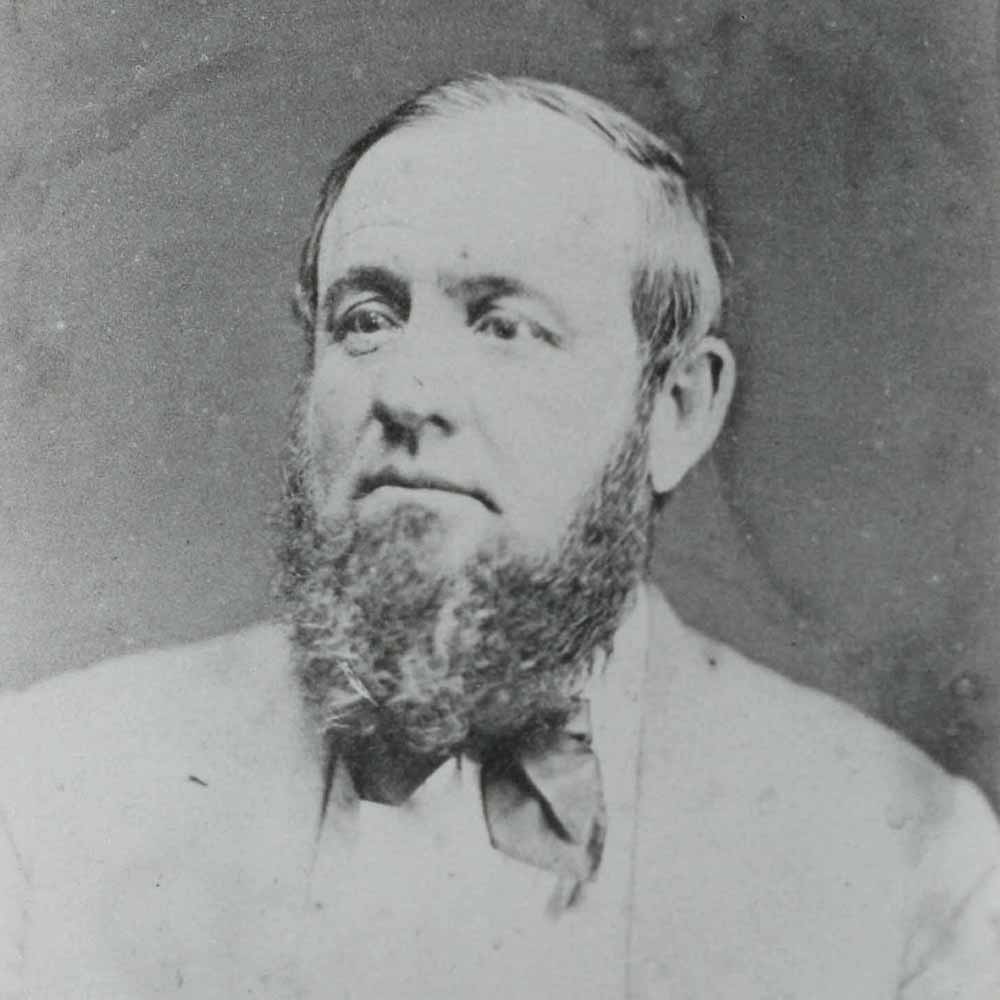
A wooden pail factory begins operations in Menasha, Wisconsin. In 1852, Elisha D. Smith buys the factory and becomes its sole employee.
Elisha D. Smith had a natural ability to inspire the trust and confidence of others. This trait propelled Menasha Wooden Ware forward and helps explain Elisha’s leadership role in the Village of Menasha, where he served elective office and was admired for his community spirit and generosity. His gifts helped fund a park and public library in his hometown and buildings at colleges across the United States.
Generous by nature, Elisha was fastidious about keeping promises. Once, during a time of economic troubles, he approached a man who had failed to pay the company a debt of $1.87. The man complied. But Elisha, seeing he was in financial straits and satisfied the debt had been repaid, gave the man $5.00 and told him to use it for his family. Back then, $5 was enough to pay the monthly rent, with something left over for groceries.
Menasha becomes the world’s largest manufacturer of turned woodenware. One of the company’s strengths is its skilled employees and their work ethic. Entire families worked at Menasha, and employees often stayed 40 or 50 years. As demand for woodenware collapsed, the company made other wooden products to stay in business, rather than fire anyone. Menasha finally closed its woodenware business in 1957 after all the employees had retired.
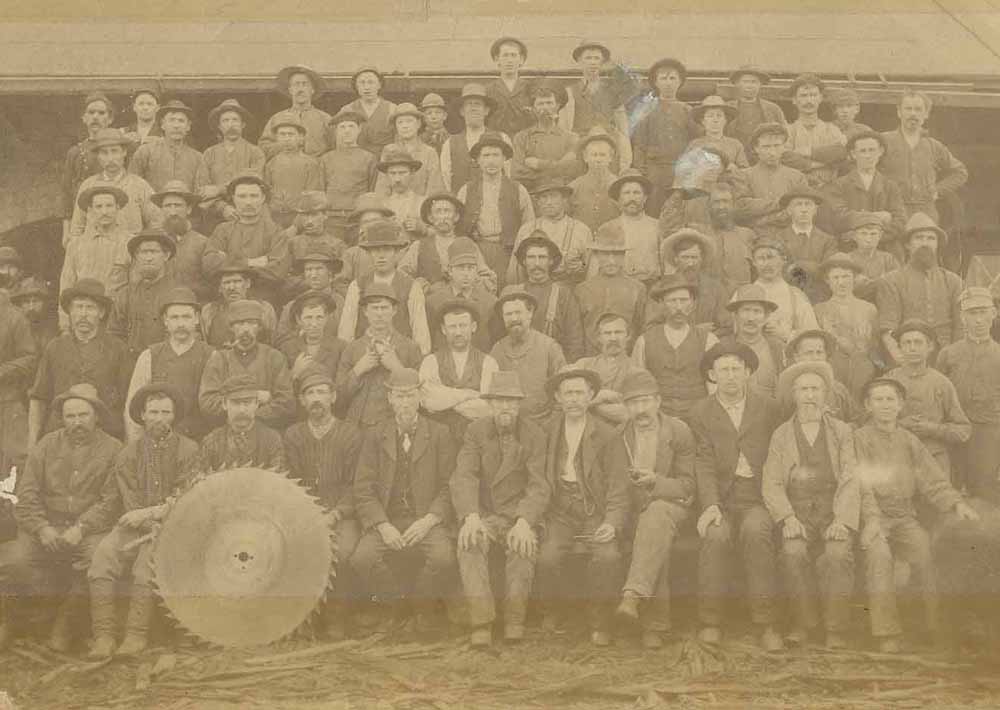
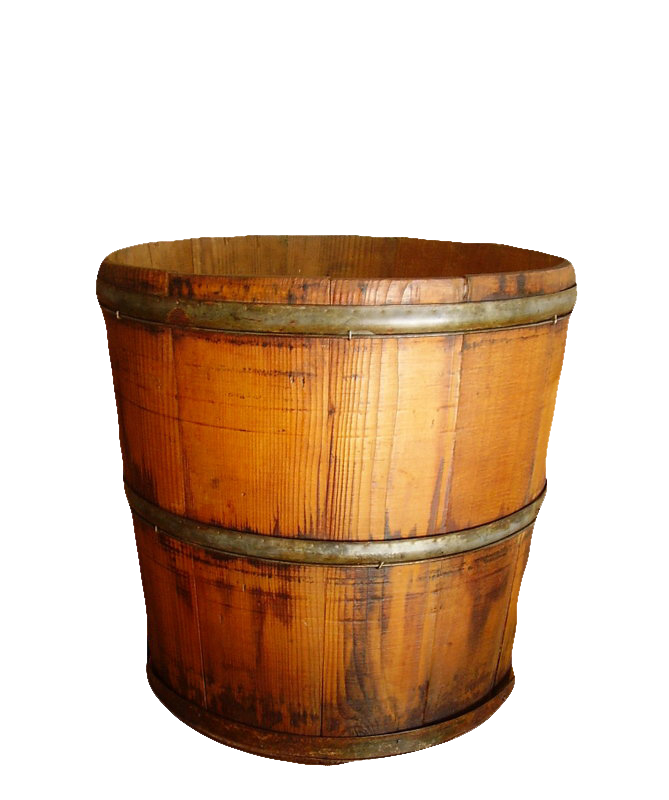
Menasha Wooden Ware is a thriving business making barrels and kegs for vinegar, sauerkraut, beer, sausage and condensed milk.
It’s also the major manufacturer of wooden pails, kits, cannikins and tubs for bulk packaging of candy, fish, lard, jelly, pickles, mincemeat and more.
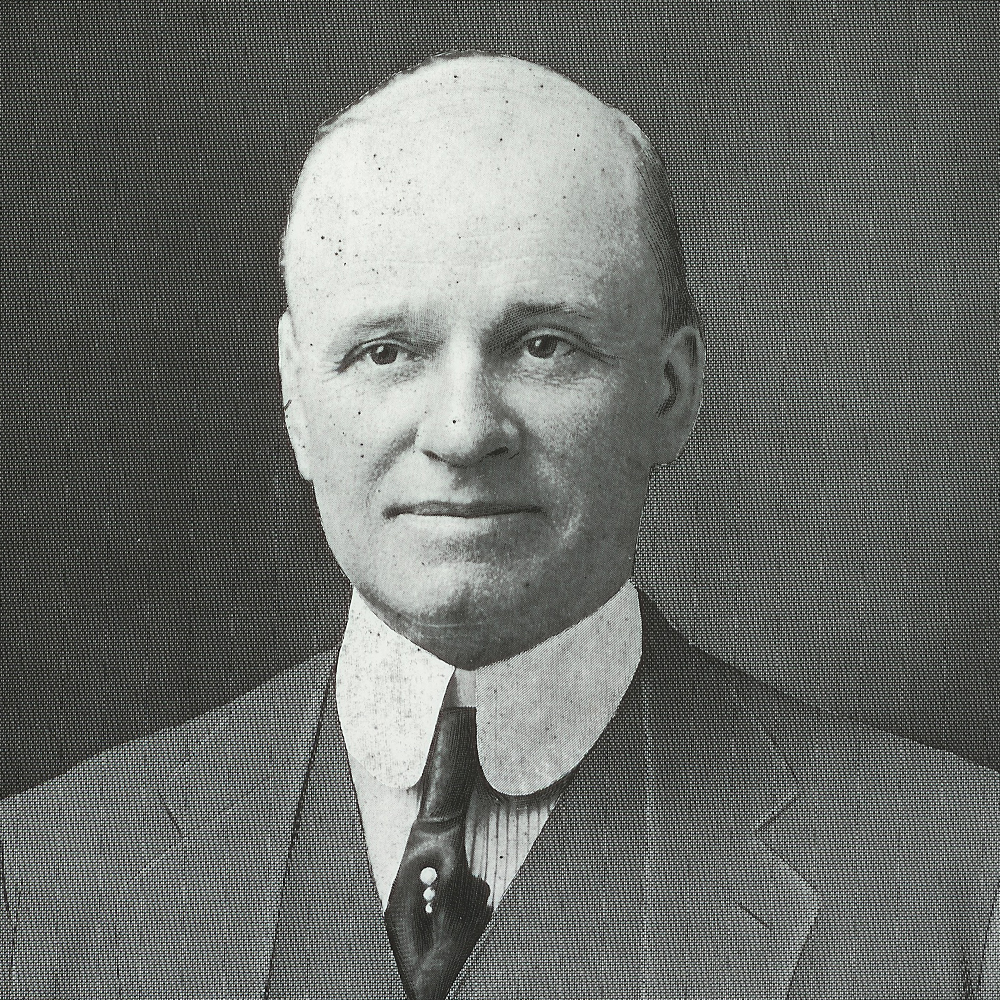
Elisha D. Smith’s son, Charles R. Smith, becomes owner and president of Menasha Wooden Ware Company, set to serve 40 years with the company.
Perhaps Charles R. Smith’s greatest contribution was to extend the company’s reach beyond Wisconsin, acquiring land and timber rights in northern Idaho. The company subsequently purchased holdings in Oregon, Washington, and Canada. These new assets assured a plentiful supply of raw materials and enabled Menasha to diversify into woodlot management and utilize sustainable forestry management practices.
A born entrepreneur with boundless energy, Charles R. Smith set up his own factory in Menasha after graduating from Princeton University in 1876. The plant started out making broom handles, and by 1880 had added large barrels to its product line. This business would merge into Menasha Wooden Ware, on whose board Charles had been serving since 1878. Charles continued many of the traditions his father had begun. He gave generously to charity and had a lifelong interest in education.
A daring decision is made in 1927 to enter the corrugated box business. Rather than hire from outside the company, Menasha gives its employees a chance to learn the new business, providing steady employment and opportunities for workers. This decision is the most ambitious and important transition in Menasha’s history—out of woodenware, into corrugated—and changes the course of the company, shaping what is today the Menasha Packaging Company.
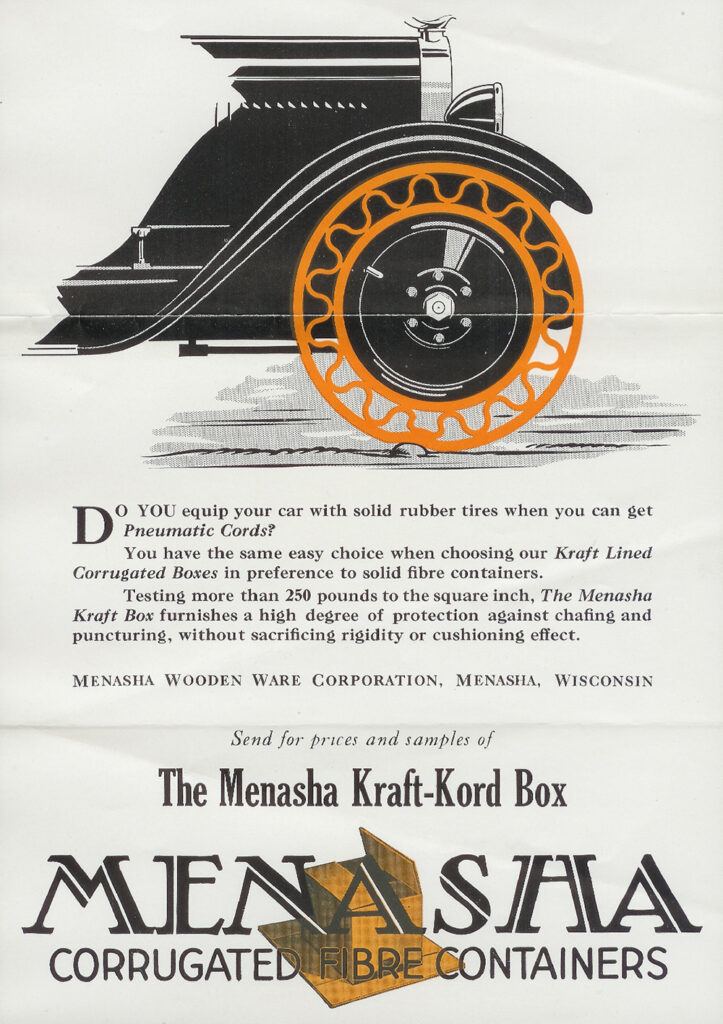
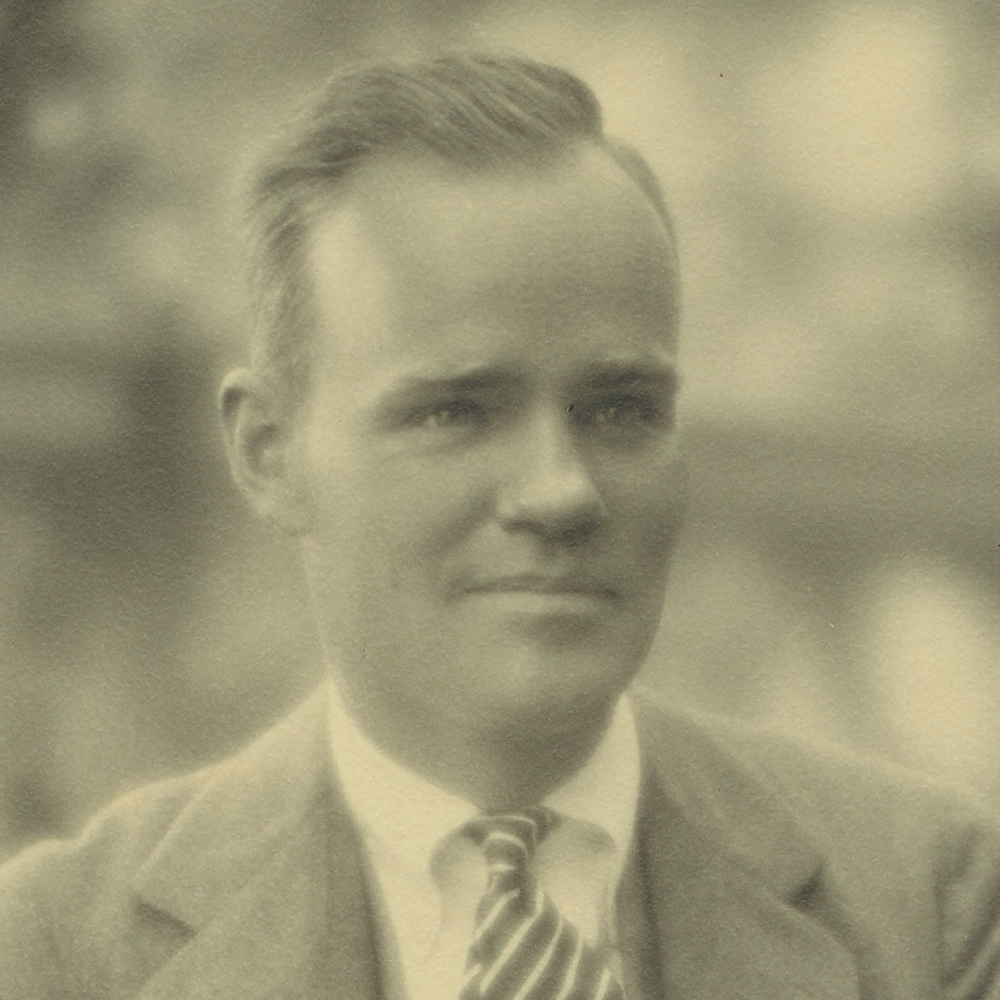
For Mowry Smith Sr., managing the family business was not an obligation but a labor of love. He learned every employee’s name, position and family background. Each workday, he went into the factory to chat with workers, greeting them by first name. And he was eager to help any employee who had a problem. One of Mowry’s passions was chopping firewood for exercise. On learning that an employee didn’t have enough firewood in the winter, he might chop a bundle and send it to the worker, anonymously.
Menasha acquires an interest in the Otsego Falls Paper Mill in Michigan.
The mill was a producer of a corrugating medium made from wood and wastepaper that consisted of a wavy center and a linerboard that formed the outer surfaces of a corrugated board. The mill was eventually sold in 2006.
Menasha invests in a plywood mill in Oregon that becomes an outlet for some of the company’s timber.
This represented a fundamental change in direction for the company – the first time since the demise of the Sitka butter tub business that Menasha made direct use of its West Coast timber by producing plywood for the home construction industry.
Just as corrugated boxes replaced wooden shipping crates, plastic containers begin to emerge as a new container material. Seizing an opportunity, Menasha acquires 51 percent of the G.B. Company of Watertown, Wis., a manufacturer of plastic containers. The company becomes the platform for Menasha’s early growth in plastics and led to other plastics-related acquisitions that have shaped today’s ORBIS Corporation.
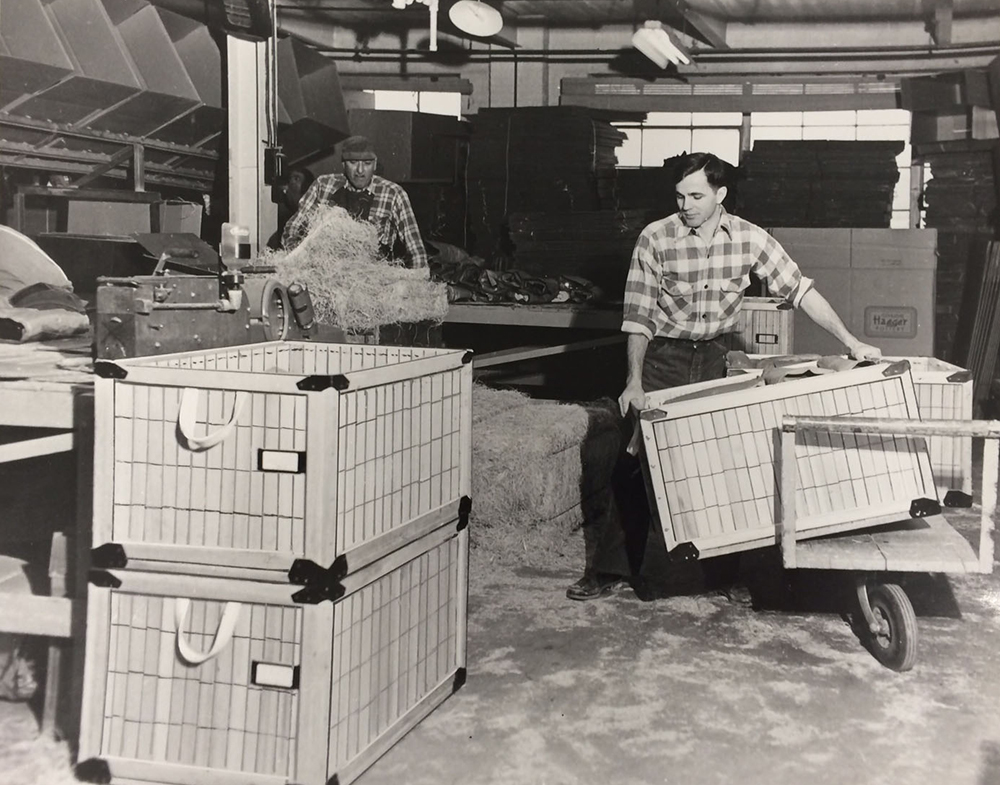
A paper mill built in North Bend, Oregon, eventually becomes one of the top performing mills in the world. The mill was one of the largest investment projects in Menasha Corporation’s history.
A fire destroys the company’s box plant in Menasha, Wisconsin.
A new corporate headquarters is built in Neenah, Wisconsin.

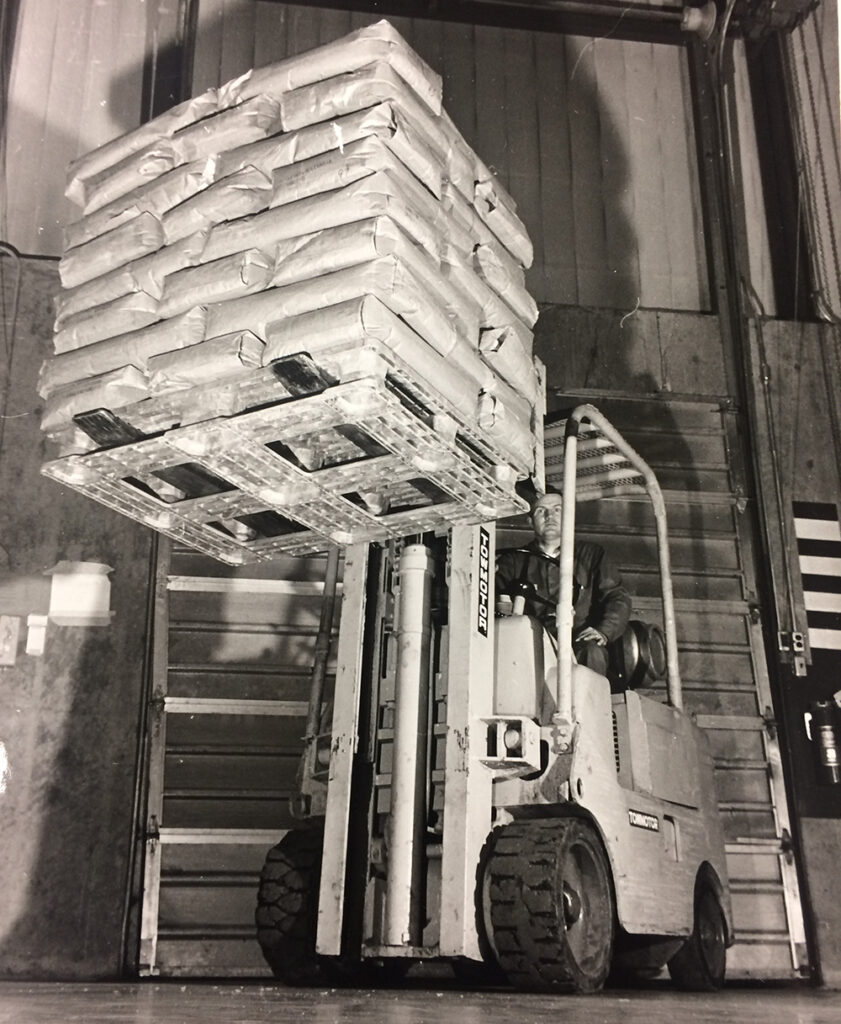
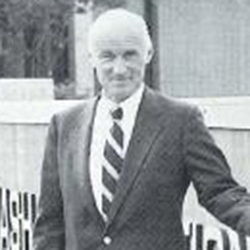
Donald C. “Tad” Shepard, Jr., grandson of Charles R. Smith, becomes president and chief executive officer, expanding the company’s investment in the plastics industry and making acquisitions that open new lines of business.
Donald C. “Tad” Shepard, Jr. led the company during one of the greatest growth spurts in Menasha Corporation’s history including an average of two company acquisitions per year—double the rate of the prior two decades. His devotion to work was so great he never took a sick day for 35 years. During his tenure, Tad created a company mission statement and operating principles, including the mandate to “place top priority on honesty, integrity and fairness.”

Donald C. Shepard, III, a fifth-generation descendant of the founder, joins the Menasha Corporation Board of Directors in 1989. In 2004, he is named Chairman of the Board, a position he held until 2023.
The company’s corrugated packaging business differentiates itself with its skill in printing high-quality color on corrugated boxes, along with the ability to design and manufacture displays for consumer packaged goods companies.
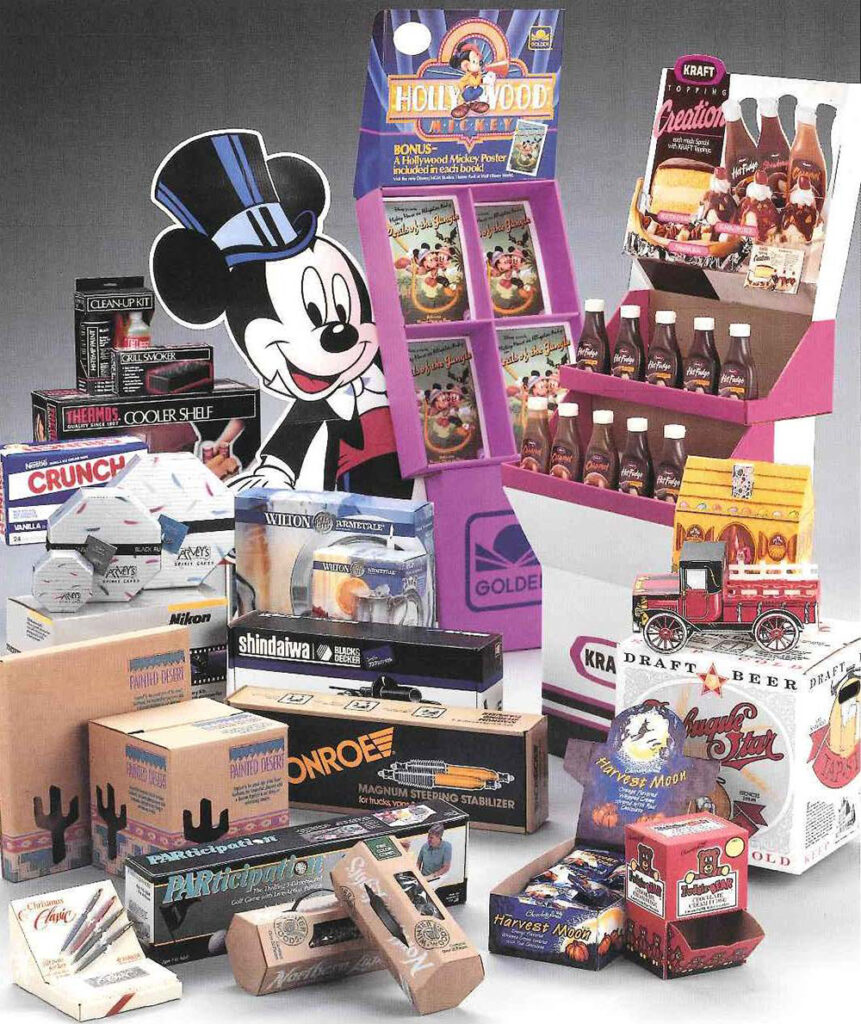
In 2001, Menasha spins off its forest products division as a separate company, Menasha Forest Products Corporation, which is eventually sold in 2007, ending the company’s involvement in timberlands and the associated businesses.
Menasha Packaging shifts from being primarily a “brown box” packaging provider to a value-added solutions source, providing strong, creative graphic features for merchandising displays and retail environments. The company also establishes its Retail Integration Institute (RII), a strategic merchandising consultancy housed within Menasha Packaging.
With RII, customers (mass merchandisers, big-box stores, grocery and drug store chains and consumer product goods companies) could evaluate various packaging and merchandising in a recreated retail environment. RII experts share knowledge on product positioning, display success, consumer appeal, and retail environment requirements for displays.

Strive’s capabilities propeled Menasha Packaging’s shift from being a packaging materials company to an integrated, fulfillment services company. The acquisition made Menasha Packaging the largest independent, in-store promotional solutions provider to retailers and consumer packaged goods companies in the U.S.
Within ORBIS, new product development and the move into custom solutions generate significant, organic growth. Acquisitions also lead a more diversified ORBIS business and allow the company to strengthen its position as the market leader to a growing automotive segment.
Acquiring Norseman Plastics in 2008 (the largest acquisition in the Corporation’s history at the time) allowed ORBIS to diversify beyond automotive, leading to major market positions in the beverage, bakery, and dairy segments. Further acquisitions in 2018 expanded offerings of custom interior protective packaging (dunnage).
Expansions of ORBIS into Mexico and Menasha Packaging Company into Canada play a pivotal role in growing market share across North America.
For ORBIS, this strategic expansion was centered around a plant investment into Mexico and for Menasha Packaging, it was concentrated on the acquisition of two Canadian packaging companies.
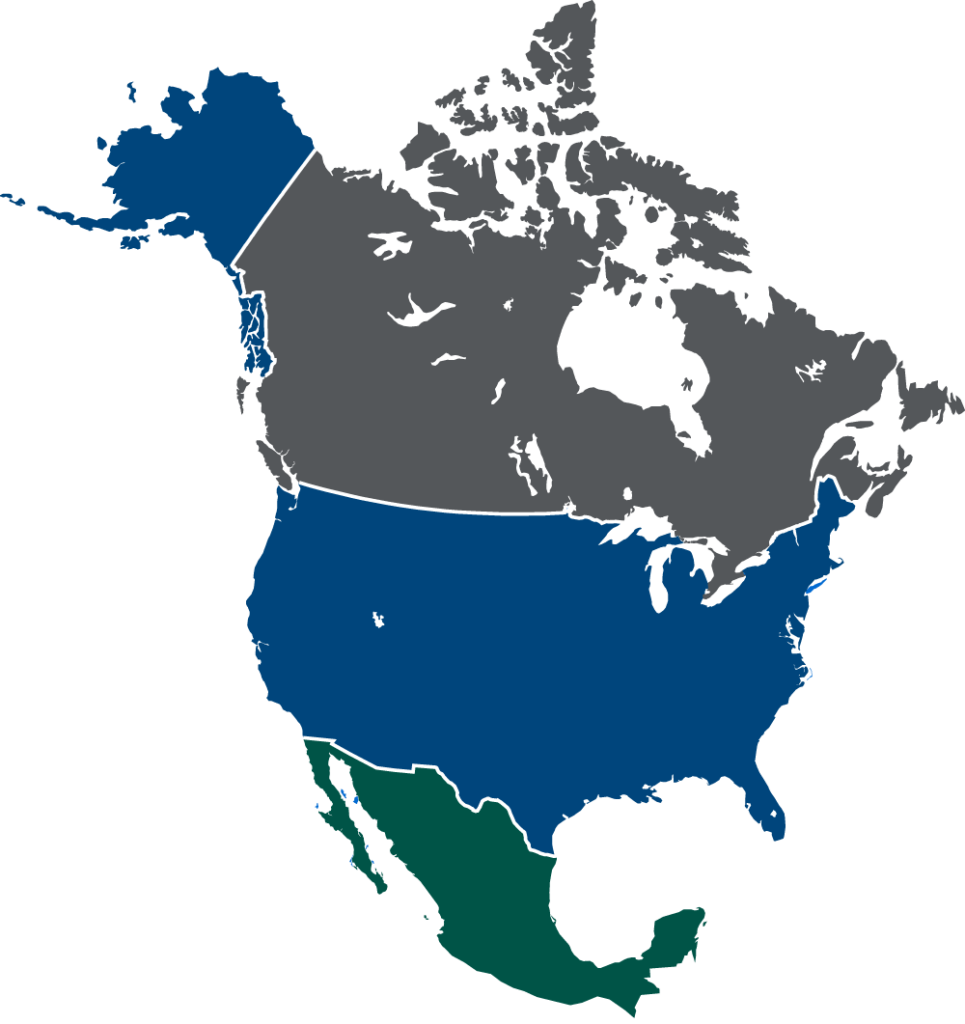
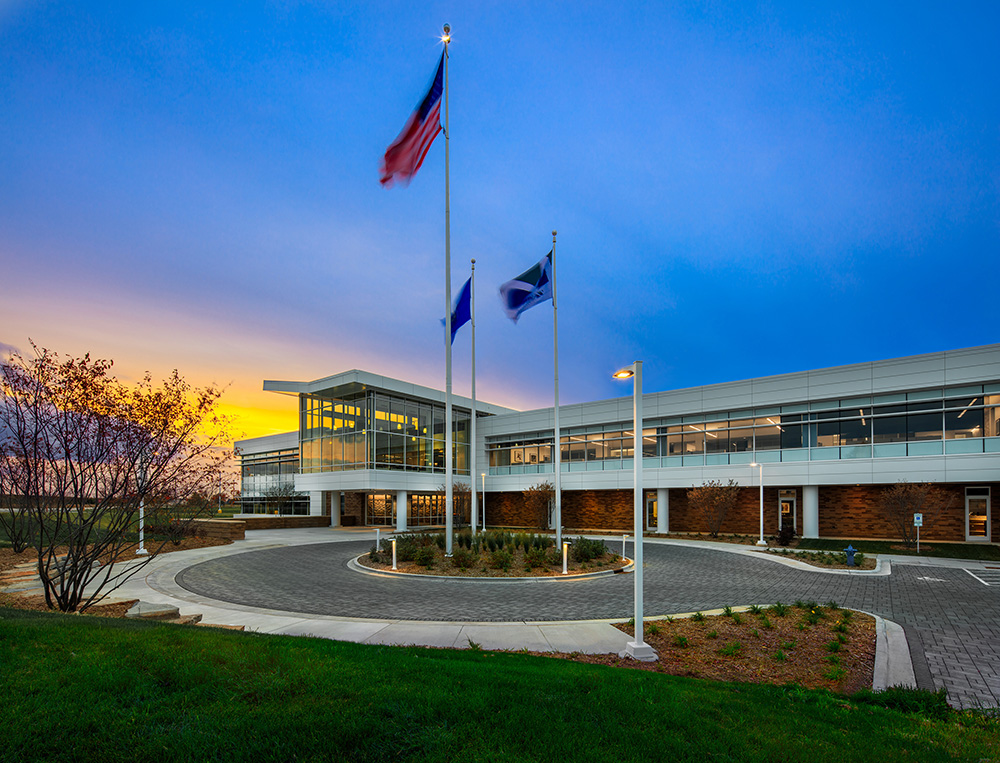
As the COVID-19 pandemic begins, Menasha Corporation’s place in the nation’s food, pharmaceutical, household, and personal care product supply chains is critical and the company is designated an “essential business.”
Practices and guidelines for the health of employees were immediately put in place to provide a safe working environment, with enhanced safety protocols such as temperature scans, physical distancing, increased sanitation, handwashing, face coverings, travel and in-person meeting restrictions.
Staying true to the company’s mission to help customers protect, move and promote their products better
than anyone else, employees enacted logistic and capacity management plans to support customers that
had significant changes in order patterns, including those who had surges and needed increased levels
of support and for those who had significantly trimmed orders because their business was shut down or
impacted.
Menasha Packaging’s Color-Box acquisition is the largest acquisition in company history.
ORBIS expands its Urbana, Ohio, manufacturing plant to increase space and utilize state-of-the-art equipment.
With the company’s 175th anniversary in 2024, the company’s ability to renew itself at key turning points continues. Creativity, responsiveness, and an increased capacity is sparking business with new customers and deepening relationships with existing ones. “People First” remains a top priority, along with serving our customers and a relentless drive to innovate.
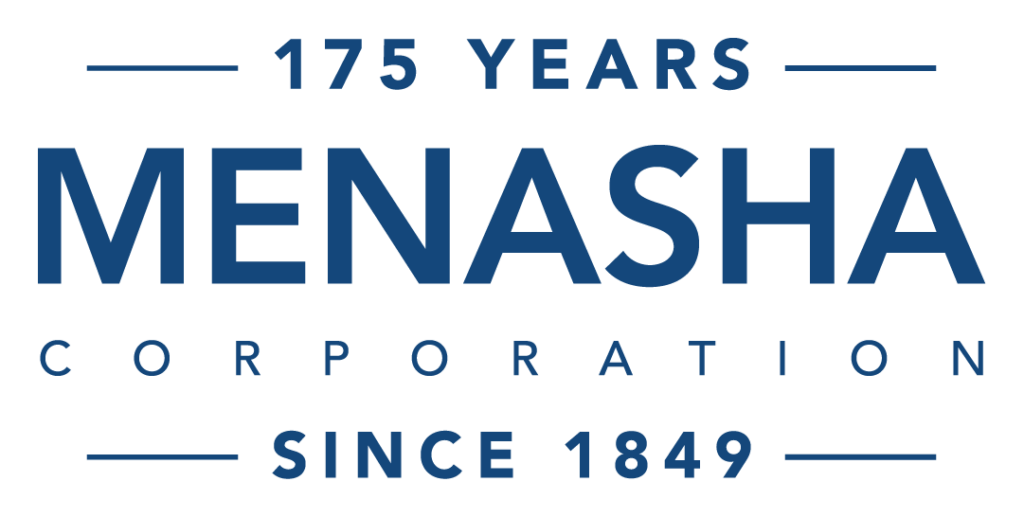
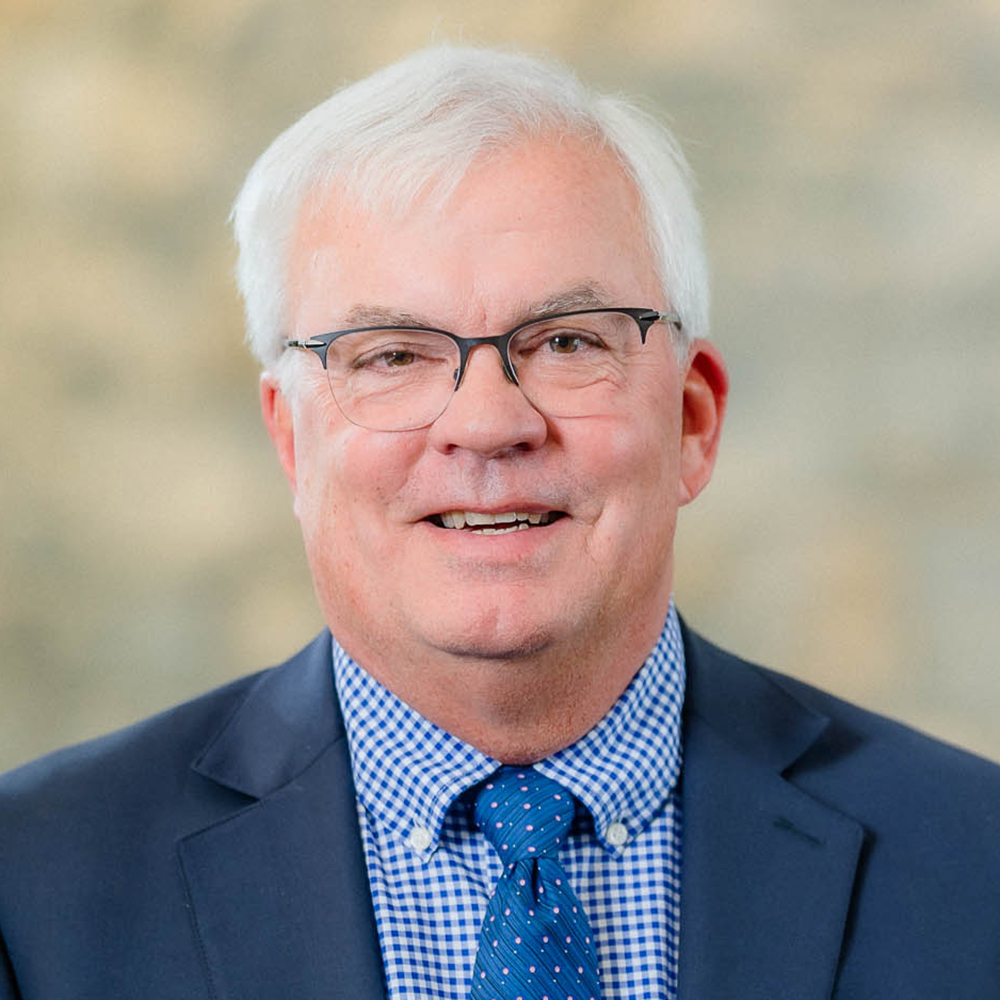
Michael K. Waite, married to Julia Shepard Waite, a fifth-generation descendant of the founder, is named Chairman of the Board in 2024.
Site Map | Privacy policy | Terms and conditions | DMCA policy
©2023 Menasha Corporation. All rights reserved.
We use cookies to give you the best online experience. Cookies keep our site secure and reliable and let us personalize your website experience. To learn more about cookies, including steps for disabling, view our privacy policy. By clicking “OK” on this banner you consent to the use of cookies unless you disable them.
We use cookies to give you the best online experience. Cookies keep our site secure and reliable and let us personalize your website experience. To learn more about cookies, including steps for disabling, view our privacy policy. By clicking “OK” on this banner you consent to the use of cookies unless you disable them.